The recent presidential election, although monumental, was not the only spectacle captivating the American public; the race for all 435 seats in the House of Representatives also garnered significant attention. Among the myriad of candidates vying for office were several healthcare professionals, each bringing their unique expertise to the ballot. As election results began to pour in, a closer examination of these candidates revealed a mixed bag of victories and disappointments, painting a complex picture of the intersection between healthcare experience and political success.
In several districts, the battles were fierce and outcomes remained uncertain. One particularly notable contest was taking place in Arizona’s District 1, where the race remained too close to call at the time of reporting. Republican incumbent David Schweikert led Amish Shah, MD (D), a physician who previously served in the state legislature, with a razor-thin margin. With only 60% of votes counted, Schweikert held 51% to Shah’s 49%. This underscores the competitive landscape where healthcare professionals are challenging established politicians but often struggle to overcome an incumbent’s advantage.
Kansas District 3 illustrated another dimension of these elections. Oncologist Prasanth Reddy, MD (R), faced a formidable opponent in incumbent Rep. Sharice Davids (D). Ultimately, Reddy’s campaign fell short against Davids, who secured her position with a substantial margin of 10%. This outcome reflects not just the political affiliations of the voters but also raises questions about the effectiveness of healthcare professionals as candidates in a partisan environment.
Despite some defeats, notable victories among healthcare-affiliated candidates were achieved across various states. In Minnesota’s District 3, Kelly Morrison, MD (D), successfully captured 58% of the votes against her Republican challenger, district court judge Tad Jude. Morrison’s win highlights the growing acceptance and appeal of healthcare professionals in legislative roles, especially in suburban areas where voters may prioritize healthcare expertise in policymaking.
Another significant win occurred in Oregon District 3. Pulmonologist Maxine Dexter, MD (D), emerged victorious over lawyer Joanna Harbour with an impressive 69% of votes. Dexter’s solid lead indicates a robust constituency that places trust in candidates with medical backgrounds, likely due to the ongoing healthcare conversations surrounding the COVID-19 pandemic and related policies.
Physicians Navigate a Shifting Landscape
The election season also saw several physician incumbents fighting to maintain their seats in the House. While many were successful, such as Ami Bera, MD (D) and Scott DesJarlais, MD (R), the overall trend revealed a shift as well. Notably, several established physician members will not be returning, including Mike Burgess, MD (R-Texas) and Larry Bucshon, MD (R-Ind.). This turnover invites speculation about the changing dynamics within healthcare representation and whether the loss of medical professionals will significantly impact health policy discussions.
Rep. Kim Schrier, MD (D-Wash.) exhibited strong early results in her reelection campaign, which may indicate that voters still value medical expertise when addressing legislative health issues. However, the impending departures of physician legislators illustrate a potential concern for comprehensive healthcare representation in the upcoming sessions of Congress.
Looking forward, the challenge persists: how can healthcare professionals transition their expertise from clinical settings to effective legislation? While several candidates succeeded in this election cycle, the results also highlight the difficulties faced when competing against established politicians. Furthermore, as the landscape of the House alters with the loss of experienced physician lawmakers, the question arises regarding future support for candidates from medical backgrounds.
The interplay of healthcare and politics continues to evolve. The recent elections reveal both the potential and challenges faced by healthcare-affiliated candidates. Examining the results offers insights not only into individual races but also into the broader implications for healthcare policy and representation in Congress. As America navigates complex health dilemmas, the need for qualified advocates in legislative roles remains paramount, raising awareness about the importance of integrating healthcare expertise into political dialogues.

Leave a Reply